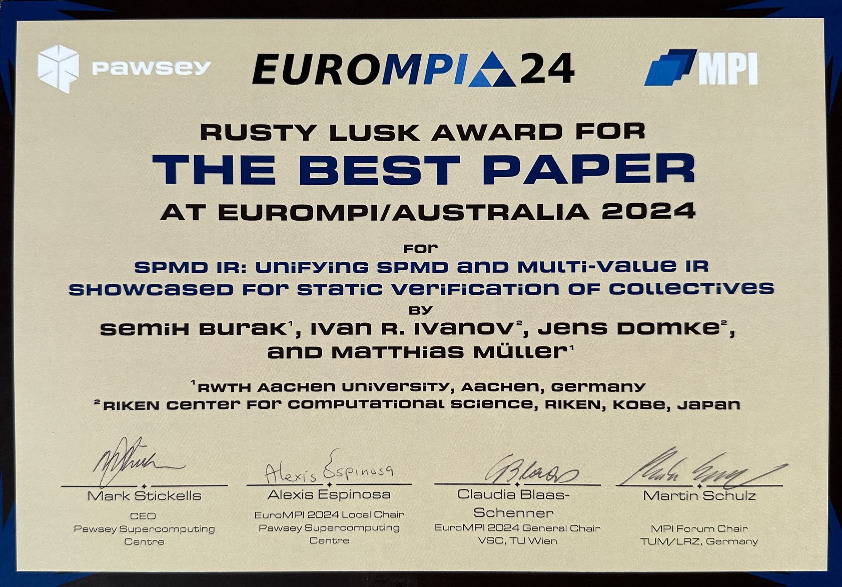We are proud: Semih Burak, member of our NHR4CES infrastructure team at RWTH Aachen University, received the Rusty Lusk Award for the Best Paper at EuroMPI/Australia 2024 for his paper titled “SPMD IR: Unifying SPMD and Multi-value IR Showcased for Static Verification of Collectives”. EuroMPI is a well known event that brings together users, developers, and researchers to engage in discussions about new developments and applications of the Message Passing Interface (MPI) and related parallel programming models.
The paper by Semih Burak et al. “SPMD IR: Unifying SPMD and Multi-value IR Showcased for Static Verification of Collectives” introduces a unifying intermediate representation (IR), called SPMD IR, to enhance the reusability and extensibility of static analysis and optimization within modern compiler systems tailored for HPC. As modern HPC systems consist of increasingly parallel CPU and GPU architectures in multi-node setups, the usage of various parallel programming models (e.g., MPI, SHMEM, NCCL) has been established for making effective usage of the hardware. However, tool developers face challenges in creating adaptable verification and optimization tools that work across models. SPMD (Single Program, Multiple Data) IR addresses these challenges by providing a standardized representation of common parallel operations, such as communication and synchronization, found across SPMD-centric programming models. The paper also describes the mapping from prevailing parallel programming models to the SPMD IR. The IR is further able to represent crucial properties of SPMD programs as a result of an extended multi-value analysis.
Once a tool is ported to the SPMD IR, it enables support for another programming model solely by converting the original representation to the SPMD IR; the implementation of the tool itself does not need to be modified. Among others, the SPMD IR increases the semantic information the compiler has over the program. A prototype implementation in the MLIR/LLVM compiler infrastructure demonstrates SPMD IR’s potential, supporting MPI, SHMEM, and NCCL models (inc. their hybrid combinations), and validating that it enables more flexible and robust compiler toolchains for diverse HPC applications. The SPMD IRs approach was successfully demonstrated and evaluated by the use case of statically verifying collective communication in comparison to state of the art.
